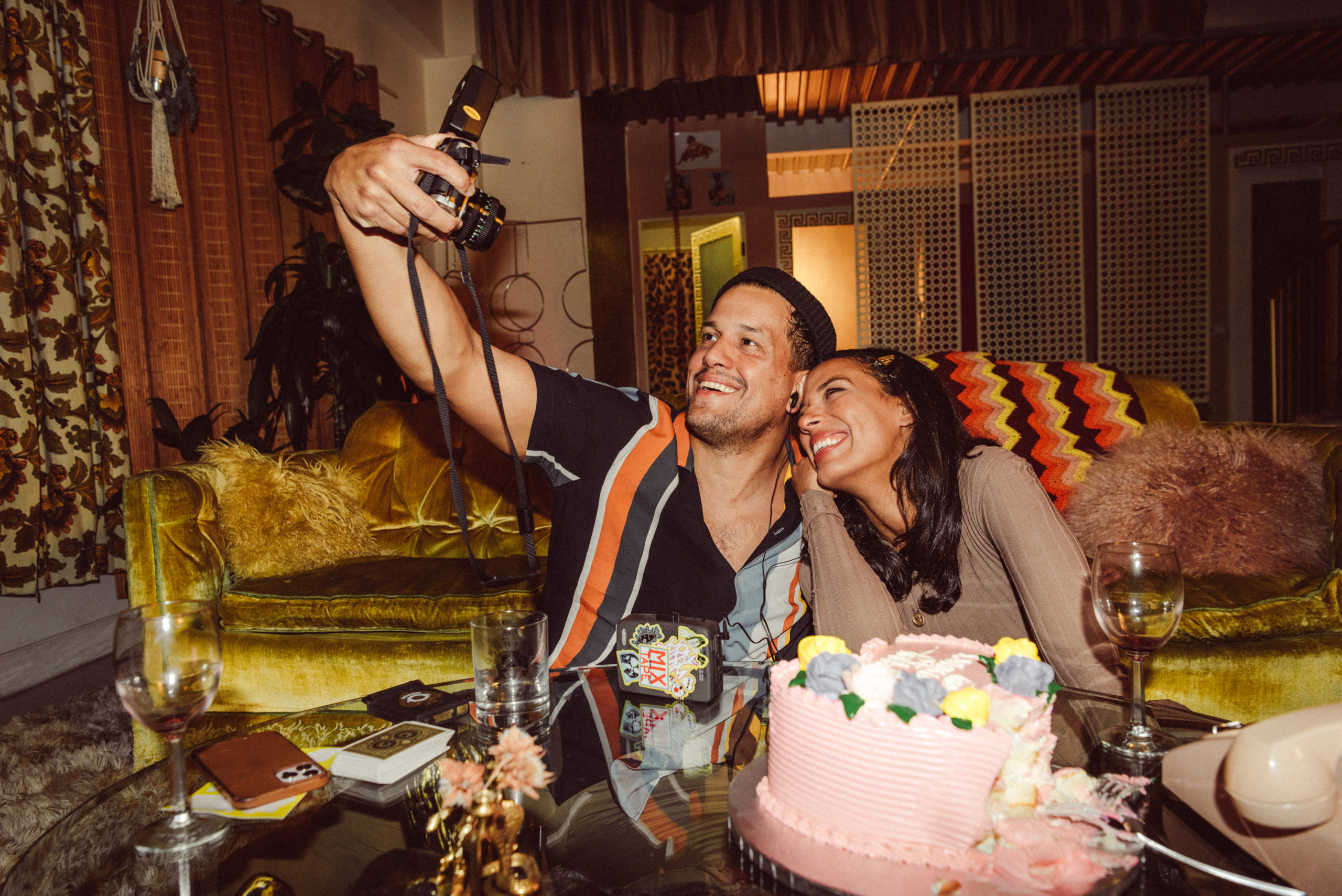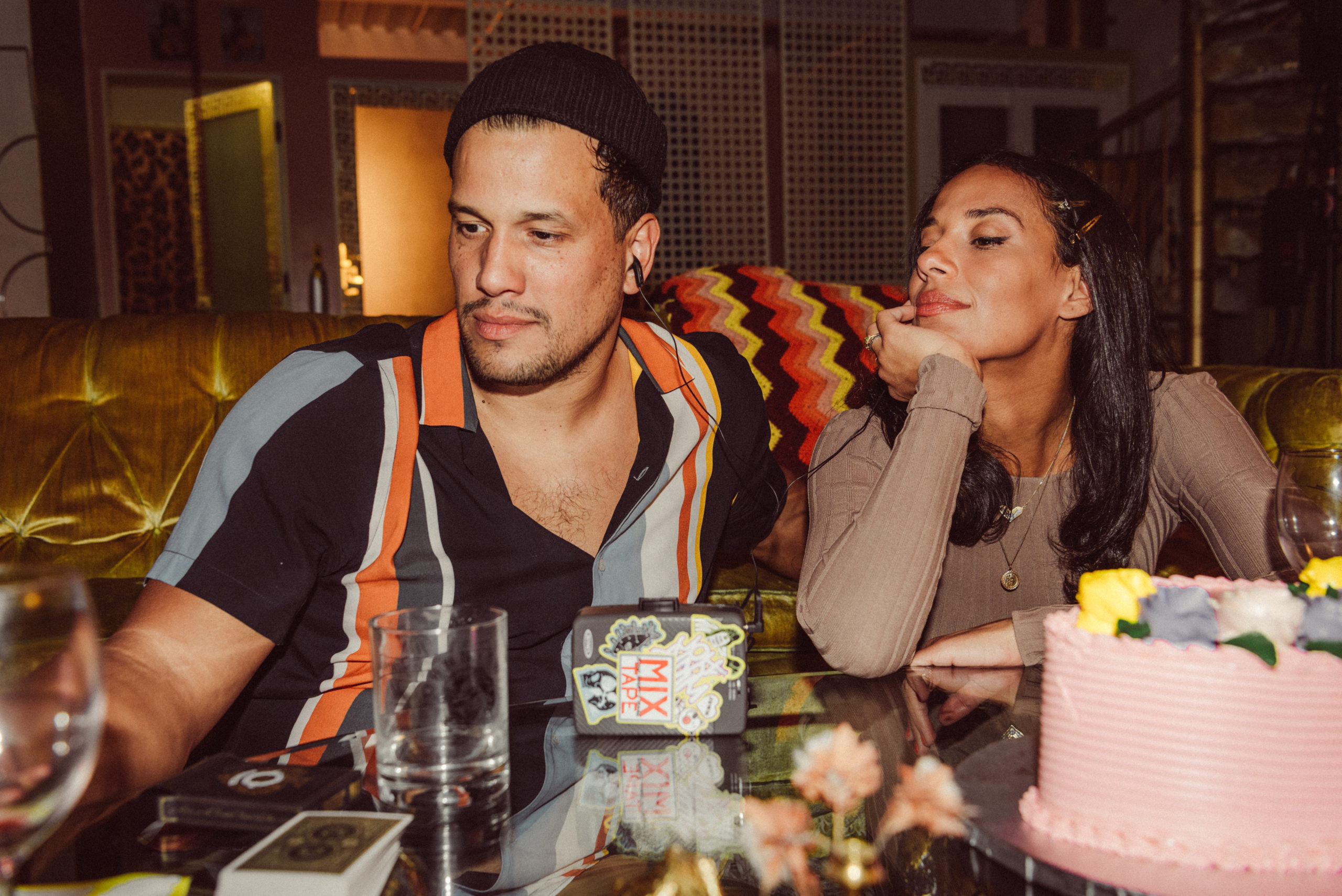If a year on lockdown has taken a toll on Abner and Amanda Ramirez, they’re not showing it. As Johnnyswim, the two have made a career for themselves as bright, engaging songwriters and performers who knew how to take a crowd of curious looky-loos and turn them into lifelong fans. It’s a rare gift — albeit one that isn’t easy to exercise in the middle of a pandemic.
But Abner and Amanda — some of the most industrious artists in the industry — found a way to keep living their lives while flexing their considerable creative muscle. They are releasing not one, but two reality series about their lives. The first, At Home on the Road, pulls back the curtain on what life on tour is like. The second is At Home With Johnnyswim, which captures the two in quarantine, following the cancellation of their 2020 tour plans and their attempts to figure out how to do what we pretty much all did last year: stay safe, stay sane and, if possible, stay spiritually, emotionally, mentally and physically serious.
Obviously, that’s easier said than done. It’s safe to say that most of us wouldn’t be interested in cameras catching us in the throes of the self-isolation blues, but Abner and Amanda aren’t most of us. They’re comfortable in the spotlight. They like the pressure. They also know there are people who look up to them. They feel that seriously.
 Both shows are headed to Chip and Joanna Gaines’ Magnolia Network, which will be part of Discovery+. In the meantime, the duo sat down with RELEVANT over Zoom (where else?) to talk about reality TV life, navigating new COVID hobbies and their frustrations with an American Christian scene that seems to be drifting from its roots.
Both shows are headed to Chip and Joanna Gaines’ Magnolia Network, which will be part of Discovery+. In the meantime, the duo sat down with RELEVANT over Zoom (where else?) to talk about reality TV life, navigating new COVID hobbies and their frustrations with an American Christian scene that seems to be drifting from its roots.
Is it weird to look back on life before COVID? Does it feel like a different era in your life?
Amanda: Absolutely. It is so strange that we used to jump into crowds and high five. He’d eat off people’s plates, which, for the record, I never appreciated.
Abner: I mean, I didn’t care. I was always proud of having a strong immune system.
Amanda: Back then, it was like my parents’ friends would call me, and be like, “Are you sure you want to jump into crowds? There might be somebody crazy. They might try to grab you or something.” That was the fear, not death by COVID.
Abner: I remember getting the call that day. Our manager was there, “Okay, yeah. So, listen. We think we’re going to have to put the tour on hold for a couple of weeks. It might be as long as a month, but it’s just on hold, and we’re going to fly you home tomorrow.”
Amanda: We actually have video footage of us finding out. Somebody was in the room with a camera, and we’re both like, “Oh, six weeks!” Like, mind blowing to be off tour for six weeks.
Abner: One thing that’s true that’s met expectations is we still don’t know how to live not being on tour. Like, we’ve filmed a TV show while in lockdown, wrote a book.
Amanda: We have chickens now.
Tell me the origin story of the chickens.
Amanda: I grew up with chickens, getting eggs in the morning. We had a little garden, so he got me a garden for my birthday like two years ago, and I was like, “Oh, chickens would be fun,” and he was just like, “Oh, chickens!” So, then we’re working on this TV show from home. Like, “Alright, what are you guys working on at home?”
So, we go and get the chickens, and the whole time in the car, he’s like, “I cannot believe we are getting these chickens.” We’re in the car, and they’re just chirping in this little box, and, suddenly, it was like a spell was cast upon him.
Suddenly, he was like, “Are they okay? Are the chickens okay?” Literally, that night, he got up in the middle of the night to go check on the chickens in the garage as if they were newborn babies of his. I don’t know if he got up to check on our babies in the middle of the night.
Is shooting stuff around the house weird? Does it give you anxiety?
Amanda: It does for me.
It’s not the same as being on stage because, on stage, there’s interaction. There’s a joint excitement for everybody to be there, and there’s community happening on stage, and this is just kind of eyeballs. This just feels like eyeballs are on you, and you have to pee, and you’re always thinking about your microphone. If you say something about somebody, like, “Oh, that guy’s so weird. I don’t know why he’s here,” and you’re like, “Crap! My microphone’s on!”
Abner: This new show that won’t be out until the fall is called At Home with Johnnyswim, and we filmed it ourselves for the most part. I bought a couple cameras. We hired some friends to hold the cameras and to be part of life with us that they already are.
Amanda: Basically, our quaranteam, my whole safety pod.
Abner: And, then, they added six robotic cameras, cameras that are controlled from a trailer that was actually behind our garage, and there’s a guy just watching us and directors all sitting in the trailer.
So, I would forget cameras are on. Now, me and Amanda are engaged in some kind of conversation that might not paint me in the best light, and I see the cameras go buzz. Then, you can see the iris inflame and, so, I’d know it’s zooming in… buzz. That was us for about six weeks.
We’ve been doing a lot of coverage of Christian Nationalism and how white supremacy has become a big part of the American Church. What is our responsibility?
Abner: Personally, I grew up in the South. I grew up next to Robert E. Lee High School, right by all these very just big confederate statues, yada yada. The confederacy lasted for four years. It began and ended and here we are hundreds of years later having people charge the Capitol with confederate flags.
Here we are still dealing with the stigma, and we still can’t take the statues down. How much longer are we going to be dealing with this Trump era?
I see the videos of all the prophets saying, “God spoke to me.” The way you hear my voice now is the way I hear God’s voice, and he said, “Trump’s going to be our president.” There’s a pastor near us, not somebody we’re close to, but distance wise, has a big church here in LA, and he very publicly was saying, “We are going to rule and reign through Donald Trump,” and this is after the election was over.
To me, it’s disgusting. It’s really gross. We’ve all decided that facts don’t matter.
The role of Christianity in the propagation of lies is tumultuous, and it’s insane to me, but, also, it makes me think, if anybody in the world is trained to believe something without evidence, isn’t it us? I believe in Jesus. I believe in the Holy Spirit. I believe in the gifts of the spirit. I believe that He set me free. When I need guidance, I pursue Him.
I believe that, when we go in the room as Johnnyswim, and we sing songs, there’s an opportunity as representatives of Jesus Christ and God himself, there are opportunities for healing in bodies and souls and minds and relationships, and we fight for that. When we’re singing, that’s the motivation behind our words, but motivation behind the voice coming out of our lungs, the breath coming out of us is that we believe through the power of God Himself, you can be changed.

Amanda: It also has to do with where people get their information from. I know the Christian circles that I grew up in, it was very much like, “Oh, we get our things from our Christian sources, and those are the ones to be trusted.”
If you have a bunch of trusted sources that are getting little bits of misinformation and those are seeds that are growing into full-blown trees that people are like just eating from, then it’s really hard to even pull them out of it even further.
Abner: That’s true because, like, Abraham receives a prophecy he’s going to have a bunch of kids. He laughs. He acknowledges his age, but he believes, despite the facts.
There is evidence, even scripturally, of the power of acknowledging facts, and even that increasing the strength of our faith.
My only real sense of overlap with the people who will buy into QAnon or willing to storm the Capitol is I understand having a lot of disappointment and mistrust of institutions because we’ve been failed by a lot of institutions over the course of our lives.
Abner: How do I explain the feeling I had when that QAnon shaman was standing in the Capitol and he started to lead a prayer? Rarely have I been able to understand something happening in front of me by using my own lyrics, but, “Give back the pieces of my Jesus. Take your counterfeit to hell,” has been running and coursing through my veins from the song we did with Drew for Goodbye Road. Ring the Bell is the name of the song.
We love Jesus. We honor so many of the sacred traditions for sure, but this isn’t right. I have friends, people I knew growing up, that I still follow on Facebook, and, to be honest, I’m real petty on Facebook.
These people are lawyers, and during the inauguration, they’re like, “Well, it’s 11:54, and he’s been sworn in. This isn’t real. This is fake. Watch out for the National Guard. Here they come. It’s all a hoax.” Where does the delusion end? In the midst of this Christian nationalism, I feel like my job has been to protect what I find holy and to protect those that I’m nearest to.
Do you feel like you have responsibility to those people who are kind of in your circle?
Amanda: I do have a few people that I love so much that are like, “Nope. We’re believing that it’s going to turn around, and we’re going to have him.” They’ll send me text messages and videos and try to engage in conversation about it, and it was just like, “No, that’s not real information.”
“Here’s the information,” and they’re like, “Well, I’m going to have to look at that, but I don’t appreciate you belittling me right now,” and I’m like, “I’m not. I’m trying to have a conversation with you because I love you, and I know you well enough to know that you’re super smart, you have a voice and you have perspective. I want you to be able to use that perspective and realize the other side isn’t just the enemy because you see me as the other side.”
Abner: There’s a dear friend of mine, who I do love, and we stand on not quite polar opposites ends of the spectrum when it comes to this thing, but we’re very different in our thoughts. We had a really great conversation that changed neither of our minds, but I think what was important is it exposed each of our hearts.
One of the things we talked about a lot was persecution, and I’m the son of Cuban immigrants that came from communist Cuba where they attempted to assassinate my father because he was a pastor. In Cuba, there was a law that came out, and these are the kind of laws you can pass in communist countries. Sure, you could have church, but you cannot say that Fidel Castro needs Jesus to go to heaven. You can’t say it. Then, they had not quite concentration camps, but labor camps that you’d go to.
My uncle was in one. My mom was sent to one. They’d come snatch you, and you’d be sent to this labor camp, and you’d work the fields for an unidentified, unspecified amount of time and that’s just where you were and what you were doing until they decided to let you go.
If you even toyed with the idea of Fidel needs Jesus, you’d go to labor camp. My dad, that Sunday, had a banner across the church he was leading in a little town near Havana that said, “If Fidel Castro doesn’t receive Jesus as his savior, he’ll burn in hell forever,” and that was the title of the sermon the first Sunday after that law was put in place.
Other pastors followed suit, and they would get arrested, but Dad was kind of this ring leader of that energy, so they tried to kill him. They’d tried to hit him with a car.
My family came here with nothing, without a dollar, without a change of clothes, without a change of underwear, risking their lives. During a tropical storm, 300 people in a 35-foot boat left the port of Mariel and got to Key West. In a trip that should have taken a few hours, it took them three days. The boats were engine failures all around, and there was a boat behind them my dad threw a rope to. They towed the boat for several miles until the rope snapped in the middle of the storm, and that boat capsized, and nobody made it from that boat. People barely made it from the boat my parents were on.
Because of what they believed, because of how they expressed their belief in Jesus Christ, this is what they suffered. So, forgive me if I don’t understand being told that you should maybe stay away from folks because you’re infectious and you could kill everyone. Please be quiet. Please worship from your home. Please pivot. Find a new way to do things. Forgive me if I don’t believe that that is real persecution.
















